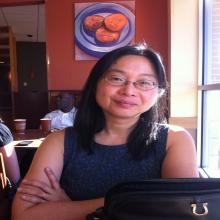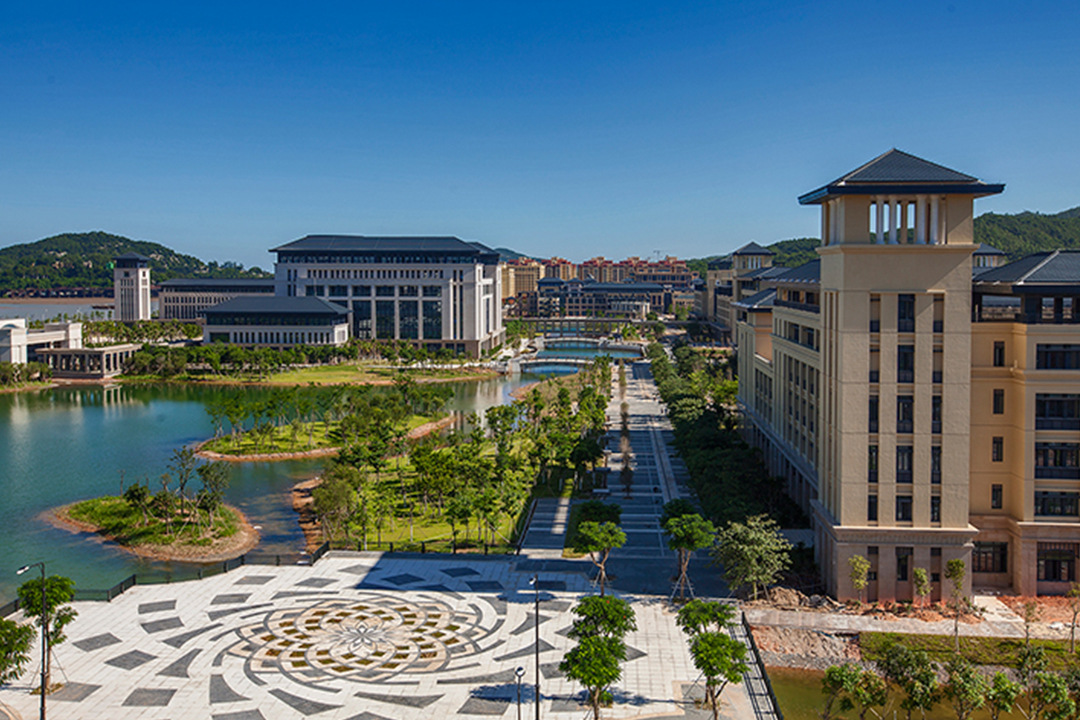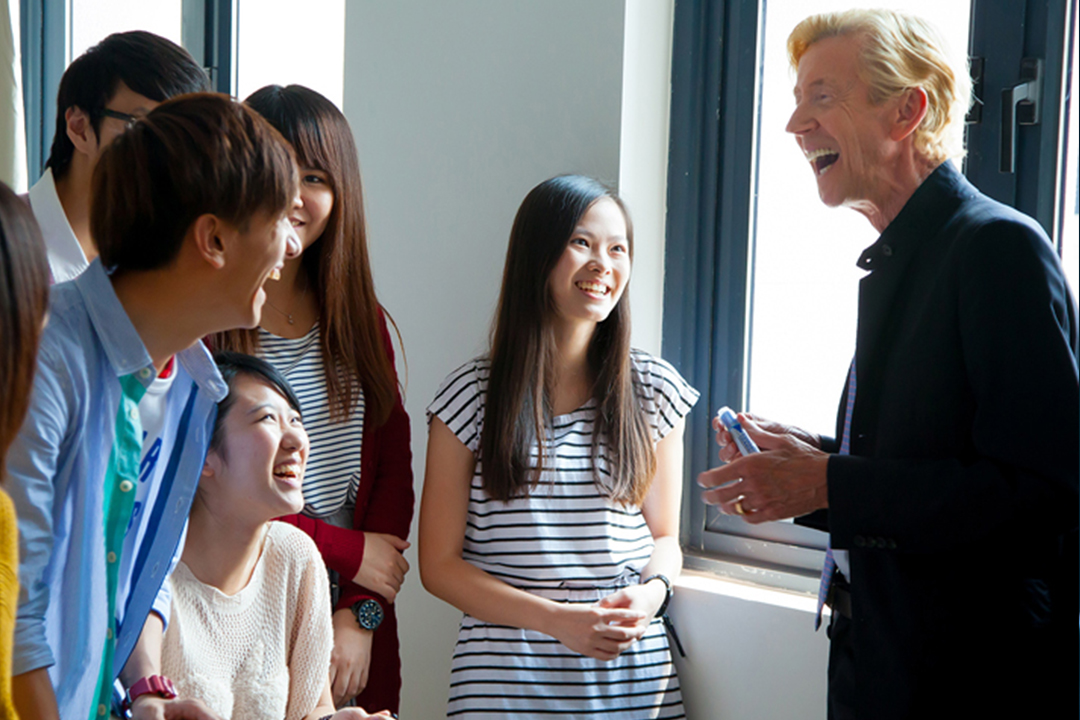By John DiConsiglio
Poised on a tropical peninsula where Asia’s Pearl River washes into the South China Sea, the city of Macau has a reputation for gaming, glitz and an historical blend of Chinese and Portuguese cultures. Its bright lights and casinos have earned it the nickname “the Vegas of China.” The city has passed from 300 years of Portuguese rule to its current status as a special administrative region of China—a mix of influences on display in Macau streets paved with traditional Portuguese tile and lined with ancient Chinese temples.
And now, with the help of a special partnership between GW’s Columbian College of Arts and Sciences and the University of Macau’s Faculty of Arts & Humanities, the city is forging a new name for itself as a home for scholarly exchange. Expanding on a relationship that began in 2015 with the creation of the Macau Friedman Scholars, a semester-long program that brought a cohort of Macau students to the Foggy Bottom campus, the two universities are teaming up again for an exchange of professorial talent.
 Associate Professor of English Patricia P. Chu
Associate Professor of English Patricia P. ChuDuring the 2015-16 academic year, Ana Luisa Varani Leal, a linguistics professor from the University of Macau, travelled to Washington, D.C., to teach Portuguese. (The University of Macau is known for its academic and research excellence in its Portuguese language and literature programs.) In turn, two Columbian College professors— Professor of English David McAleavey and Associate Professor of English Patricia P. Chu—will spend, respectively, the upcoming fall and spring semesters in Macau, teaching poetry, creative writing and literature to students at the English-speaking university.
An initiative spearheaded by Columbian College Dean Ben Vinson, the Macau exchange builds on a pillar of the university's strategic plan: a drive toward globalization that promotes shared international research and academic excellence. “The faculty exchange is a showcase for the college’s strengths beyond our borders and an example of the welcoming environment we provide for scholars from around the world,” Vinson said. “It’s a starting point,” added Columbian College Executive Director of Global Initiatives Frances Taoran Sun, that could lead to similar collaborations around the world.
“We are building a terrific relationship with Macau while exposing our students—and faculty—to experiences that they can’t get anywhere else,” Sun said. “We foresee forming comparable relationships with other international academic institutions.”
Since returning to Chinese control in 1999 after centuries of Portuguese colonialism, Macau has enjoyed a self-governing status similar to Hong Kong. The city maintains its own government, economy and educational and legal system while China is responsible for its defense and foreign relations. The mix of languages, customs and cuisine has made Macau an especially diverse location. A visitor can breakfast on Portuguese egg tarts, lunch on a salty-sweet Chinese meat delicacy called bakkwa and enjoy a dinner of minchi, a traditional Macanese pork and rice dish. In the classrooms at the University of Macau, students read novels in English, discuss research findings in Cantonese and write terms papers in Portuguese.
“This is going to be a great adventure,” said McAleavey, who leaves for Macau in August where he will spend the fall semester teaching American poetry and creative writing. “It’s a chance to explore a new culture and exchange knowledge and teaching methods with our international colleagues. It’s a very exciting time.”
For Leal, coming to GW from Macau added another stop on her teaching journey. In addition to conducting classes in Macau and the United States, she’s taught in Senegal, Portugal and Brazil. A Rio de Janeiro native, she guided GW students through the subtleties that varied nations and regions bring to Portuguese dialects. “English is spoken differently by Americans, Australians and the British. It’s the same with Portuguese,” she said. “The Portuguese spoken in Lisbon is not the same as the Portuguese spoken in Sao Paulo.” And, with the burgeoning Brazilian economy, universities are seeing a demand for Portuguese language courses, particularly the relatively rare programs that emphasize Brazilian Portuguese.
Martin Valencia, a senior economics major who took Portuguese to complement his Spanish proficiency, enjoyed how Leal drew on her own experiences in other countries to illustrate linguistic challenges. “It gave me some perspective in how languages can be so different—even within the same country," he said. "It also made me feel better about my own difficulties learning Portuguese.”

While Leal said her Macau students responded to formalized lectures, her GW classes engaged in give-and-take discussions—and were quick to question her on everything from grammatical nuances to Portuguese slang. “The students created such a stimulating atmosphere,” Leal said. “I felt like we were sharing and growing together.”
To engage her class, Leal often related language lessons to food, music and culture. “You could see her international teaching experience by the way she was so emotionally open and playful with her students,” said political science major Javier Cuevas-Landron, who took the course to prepare for a European internship.
Meanwhile Professors McAleavey and Chu are preparing for their voyage to Macau with the help of Chinese language lessons from the GW Confucius Institute, Skype meetings with University of Macau officials and Leal’s own insights on the school's academic environment. Chu, who has visited China a handful of times, said she’s looking forward to comparing notes with Macau students and scholars. “For me, the trip is part of a life-long interest in understanding China better,” she said.
Both GW professors plan to adapt their courses and teaching styles to connect with Macau classrooms. McAleavey, for example, scoured American poetry from Emerson to Whitman in search of authors who not only address the American experience but also present poetry as a universal art form. He suspects that Emily Dickinson’s observations of nature may remind Macau students of lyrical Asian poets. But his trickiest task, he predicted, will be introducing his Macau classes to the workshop methodology of creative writing, which involves critiquing others’ works. “Not only does it require each student to emphasize his or her own creativity, it asks them to offer useful comments to one another in public,” McAleavey said. His challenge, he said, will be to encourage reticent students without embarrassing them, while injecting an “American flavor” into classroom discussions.
Having frequently taught creative writing to GW students for whom English is a second language, McAleavey has no worries about Macau natives expressing themselves in a different tongue. Poetry, he said, translates to all nationalities. “If your desire to write poems is strong, if you have already jumped off that cliff, then it doesn’t matter what language you speak, a good teacher can help you fly.”


